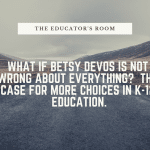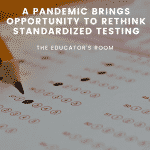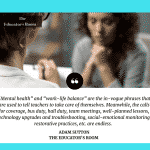“The Commission recommends that states help families return to work with access to K–12 education by making existing education funding student-centered and portable.”
“Hell, yes!” You can hear parents across the country yell upon reading the quote above, taken from The National Coronavirus Recovery Commission recommendation for k-12 education. For many American parents, this extended experiment in “home” schooling has driven many to day drinking. Even educator parents have struggled to juggle the demands for their children and their students. Most people are appreciating teachers and discussing paying them millions of dollars.
[bctt tweet=”Except, some influential people do not want to support public schools or public school teachers. ” username=””]
There exist power-brokers who do not appreciate public schools. They see public educators as agents of indoctrination of anti-American values. Public schools, they say, have removed God and prayer. Public school teachers, they say, support LGBTQ causes. They call public schools “failing government schools.” They call teachers “losers.” Unfortunately, the commissioners on The National Coronavirus Recovery Commission share this disdain for public schools.
These individuals and their well-funded institutes (The Heritage Foundation and the Cato Institute) have tried in many ways to dismantle public education. Beginning with the “Nation At Risk” report to the “No Child Left Behind,” and followed most recently with the Common Core of Professional Standards and the Race to the Top accountability movement, public schools have taken hit after hit.
The devil is in the details and the specific words included in the commission’s report. Let’s return to the general guidance for schools: “… states help families return to work with access to K–12 education by making existing education funding student-centered and portable.”
The words appear innocent and appropriate until one focuses on two terms: student-centered and portable.
The term student-centered has become a buzz word in education. Teachers, administrators, and politicians claim that decisions are student-centered. However, most decisions are dependent on money and adult-centered concerns. For example, the district my youngest daughter attends is facing severe budget shortfalls. To save 300,000 dollars, they plan on reconfiguring the district’s school buildings, making a 7-12 high school—this decision is not based on what is best for students, but on a monetary necessity.
Portable may have one thinking about remote schools, laptops, internet access, etc. However, the commissioners mean the transfer of funds.
“States should immediately restructure per-pupil K–12 education funding to provide education savings accounts (ESAs) to families, enabling them to access their child’s share of state per-pupil funding to pay for online courses, online tutors, curriculum, and textbooks so that their children can continue learning.”
Education savings accounts divert tax dollars from the collective pool of resources to individuals’ bank accounts. A foundational belief in the educational choice movement, a Christian-based initiative, is that parents be allowed to take their tax dollars and shop for the “best” educational experience.
“Students are currently unable to enter the K–12 public schools their parents’ taxes support. They should be able to access a portion of those funds for the remainder of the school year in the form of an ESA. Parents would receive a portion of their child’s per-pupil public school funding in a restricted-use account that they could then can use to pay for any education-related service, product, or provider of choice.”
Under the commission’s guidance, parents would be able to use tax dollars (or a portion of those monies) to choose an alternative educational experience. Would low-income families be able to use this money to buy a different school for their children? Or, do education savings accounts augment disgruntled parents’ funds? Families who can already afford private school tuition benefit most from education savings accounts, otherwise known as vouchers.
(Disclaimer: I am one of those unhappy parents. I pay thousands of dollars to send my children to an out-of-district public school. Our home district lacks many college-credit courses and athletic opportunities that my children need. I appreciate that many schools have problems. I question, however, the impact of the widespread use of vouchers. How will our public schools function with fewer funds?)
The commission goes on to declare that the quality of a teacher’s education, experience, and skill does not matter. The report claims that their findings are research-based.
“Research suggests that there is little if any difference in student academic outcomes between teachers who are traditionally certified, alternatively certified, or not certified at all. “
I will just leave that right there.
In this time of quarantine, we are desperate for a plan to move us forward. The National Coronavirus Recovery Commission, however, is a proposal grounded in partisan power.
Ultimately the U.S. Constitution reserves powers to the states, one of those being education. The commission, led by unelected business people, can offer suggestions, but not dictate drastic changes to public schools. Furthermore, parents are desperate for their children to return to school and could care less about education savings accounts and voucher schemes. Parents, and all Americans, want to return to “normal” life.






